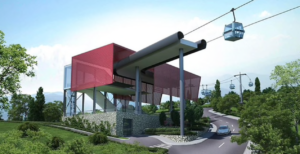
In one of most-visited locations in the world, visitors in Jerusalem will now be able to reach the Western Wall in just minutes, thanks to a new project which aims to ease congestion in the ancient city.
– Palestinian neighborhoods above which the cable cars will pass, oppose the project.
By Yael Fridson
Seventy-one years after a cable car brought in supplies for besieged fighters on Mount Zion during Israel’s War of Independence in 1948, cable cars are making a comeback in the capital.
The National Infrastructure Committee has approved a plan to build cable cars to transport people in and out of the Old City by air.

The map and an illustration of the cable cars – Photo: Courtesy of the Jerusalem Development Authority
According to the project’s developers – Jerusalem’s Development Authority and the Ministry of Tourism – the cable cars are intended to ease traffic congestion in the city and improve access to the southern part of the Old City.
The cable car is able to transport 3,000 passengers per an hour for a ride that lasts four-and-half minutes in each direction The project will cost an estimated NIS 200 million (approx. $50 million) to implement.
The cable car route will go through the Valley of Hinnom outside the Old City’s walls, Mount Zion, the City of David and the Dung Gate, adjacent to the Western Wall.
Ze’ev Bielskim, the head of the National Infrastructure Committee, said the plan would rejuvenate the capital and faciliate travel around it.

Cable car project in Jerusalem – Photo: Jerusalem Development Authority
“This is a plan that brings true renewal to the city of Jerusalem,” he said. “The plan allows for comfortable and easy access for those visiting the Old City of Jerusalem. The plan will bring an end to the wall of buses that is a daily feature at the entrance to the Old City, and will make (movement) easier for the place in Israel most visited by tourists,which is one of the most visited places in the world.”
The project has already sparked opposition from architects and environmental activists who protested the damage the cable car poles would cause to the unique landscape of Jerusalem. The residents of Silwan, the East Jerusalem neighborhood above which the cable cars will pass, also oppose the project.
Israeli NGO “Emek Shaveh,” which works to preserve archeological sites, also expressed opposition to the cable cars, saying that the claims they would ease public transport congestion were “misleading.”
“Unfortunately, the National Infrastructure Committee is hiding behind a wall of excuses instead of telling the truth – that this devastating project was planned for the good of the City of David Foundation.
“Our battle is not over, as we will continue fighting against (the cable cars) in court. We hope the next government or Tourism Ministry will preserve the dignity and status of the Old City of Jerusalem and cancel the plan.”
View original Ynet publication at:
https://www.ynetnews.com/articles/0,7340,L-5520779,00.html






 Israeli New Shekel Exchange Rate
Israeli New Shekel Exchange Rate